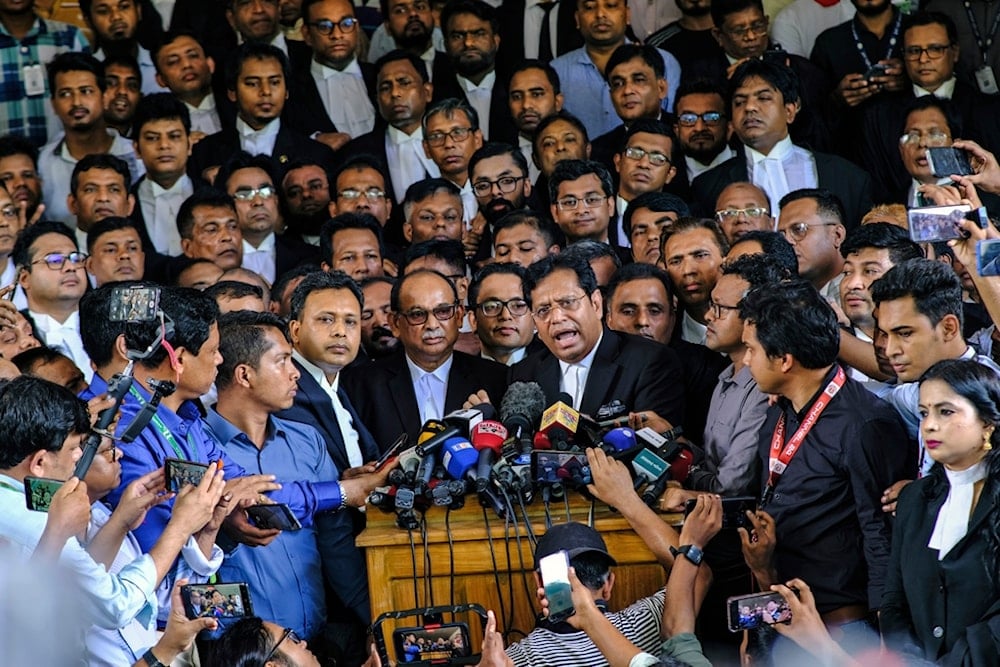Bangladesh's top court reduces job quotas that sparked unrest
The job quota has been slashed to 5% down from 30%.
-

Lawyers address reporters outside Bangladesh's Supreme Court in Dhaka, Bangladesh, Sunday, July 21, 2024. (AP)
The Supreme Court of Bangladesh on Sunday significantly reduced the number of government jobs reserved for war veterans and their descendants, in a landmark decision following violent student protests that resulted in 155 deaths.
Shah Monjurul Hoque, a lawyer representing student groups, indicated that the court ruled that only 5% of government jobs will now be reserved for the children and grandchildren of those who fought for Bangladesh's independence from Pakistan in 1971, down from the previous 30% quota for this group.
The court's ruling also reduces quotas for other groups and abolishes quotas for women and those from certain districts. The quota for ethnic minorities is reduced to 1% from 5%, while the existing 1% of jobs reserved for people with disabilities remains unchanged.
Overall, the ruling decreases the number of reserved jobs from 56% to 7%, opening up many more civil service positions to university students who had deemed the previous system unfair and demanded its overhaul.
Since July 1, thousands of students have been protesting the reinstatement of the quota system, which was abolished in 2018 but restored this year.
With around 18 million young people in Bangladesh out of work, according to government data, the reintroduction of the quota scheme has deeply frustrated graduates who are already facing a severe job crisis.
Last week, the government deployed police and paramilitary forces to contain the violence, but the students persisted. On Friday, the government imposed a curfew and brought in the army to curb the protests. Police have also been issued "shoot-on-sight" orders.
The quota system was originally implemented by Sheikh Mujibur Rahman, the founding leader of Bangladesh and father of Prime Minister Sheikh Hasina, as a reward for "freedom fighters" who fought in Bangladesh's 1971 liberation war against Pakistan. In 1997 and again in 2010, the quotas were expanded to include the descendants of freedom fighters.
Students argued that the system was unfair and called for most government jobs to be awarded based on merit.
In June, the high court reintroduced the quotas after descendants of the war veterans advocated for their reinstatement. When the protests began, the Supreme Court temporarily paused the reinstatement pending a final decision, which was delivered on Sunday.
Sheikh Hasina further inflamed tensions this month by likening the protesters to the Bangladeshis who collaborated with Pakistan during the country's independence war.
In response to the unrest, police have arrested several members of the main opposition Bangladesh Nationalist Party (BNP) and the group Students Against Discrimination.
Bangladesh's Home Minister, Asaduzzaman Khan, told AFP that the curfew imposed on Saturday would continue "until the situation improves."
He stated that in addition to protesters torching government buildings and police posts, arson attacks had rendered Dhaka's metro rail network inoperable.
Hoque said that the court urged students "to return to class" after issuing its verdict.
"As the demands of students are met, they should stop the protests," Am Amin Uddin, the country's attorney general, told reporters after the verdict.
"We welcome the Supreme Court verdict," a spokesman for Students Against Discrimination, the main group responsible for organizing the protests, told AFP on condition of anonymity.
"But we won't call off our protests until the government issues an order reflecting our demands."
Read more: News channels and telecommunications disrupted amid Bangladesh unrest

 4 Min Read
4 Min Read








